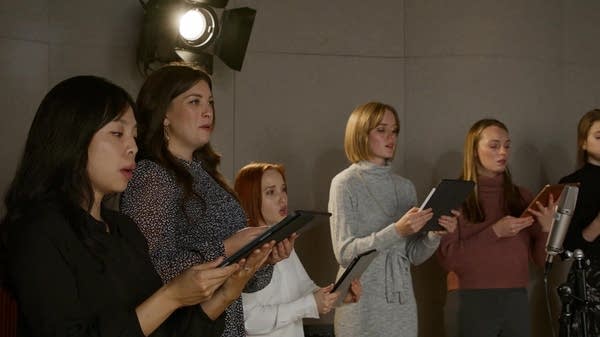You hear it everywhere around the holidays — in concerts, in churches, in shopping malls. George Frideric Handel’s oratorio Messiah is one of the best-known and most frequently performed choral works, whether it’s Christmas or Easter. There’s much more to it than its greatest hit, the “Hallelujah” chorus.
Handel wrote the work in 1741 (in only 24 days!) based on text from the King James Bible and the Coverdale Psalter, by Handel’s friend Charles Jennens. The composer had already written five oratorios, in keeping with changing public musical tastes, when Jennens sent him the libretto for what would become Messiah.
In a letter to another friend, Jennens wrote: “I hope [Handel] will lay out his whole genius and skill upon it, that the composition may excel all his former compositions, as the subject excels every other subject. The subject is Messiah.”
Behind the music
The extended meditation on the life of Jesus Christ is divided into three parts, a structure that echoes an opera. Each part encompasses scenes and movements in the form of arias, recitatives and choruses, reflecting an amalgam of musical influences (German, French, Italian and English). Although it has a religious theme, Handel wrote the theatrical work for the concert hall, not the church, which contributed to its popularity.
Here are the sections:
Part I - “Prophecy and Fulfillment”: This includes “Ev’ry Valley Shall Be Exalted,” “And the Glory of the Lord” and “For Unto Us a Child Is Born,” and it incorporates the Old Testament prophet Isaiah foretelling the birth of Jesus.
Part II - “Suffering”: This concentrates on the Passion and concludes with the triumphant resurrection chorus, the famous “Hallelujah.”
Part III - “Redemption”: This recounts Paul’s teachings on the resurrection and Christ’s glorification.
Holiday tradition
But let’s back up. Why is “Hallelujah” — an Easter anthem — and the entire work so popular at Christmas?
“By 1900, the Messiah was so closely linked to Easter that people began to expect to hear the oratorio every year,” author Ace Collins writes in Stories Behind the Great Traditions of Christmas. “A performance of the Messiah was the surest way to fill up a church or concert hall.”
He adds that Messiah’s move to Christmas was a marketing ploy: “The large crowds that turned out each Easter to hear the oratorio prompted marketers to rethink the timing of the annual presentation of Handel’s work.”
For a long while, it was a standard for both holidays, but since the 1960s, Messiah has been largely transformed into a Christmas event.
And what about the custom of standing for the “Hallelujah” chorus?
It originates from the story that, at the work’s London premiere in 1743, King George II was so moved that he rose from his seat, obliging the rest of the audience to do the same. However, there is no persuasive evidence that the king attended the first or any subsequent performance. Since reaction to the work was originally modest, this perhaps was always a suspect theory.
But if you attend, you stand, king or no king. As Handel wrote after completing the chorus, “I saw heaven before me and the great God himself.”
Great recordings
Because of Messiah’s history and variations in interpretation, there is no “perfect” recording, but here are a few acclaimed ones to explore.
Hermann Scherchen: The German conductor helmed the first recording based on Handel’s original scoring in 1953, leading the London Symphony Orchestra and the London Philharmonic Choir. That version is out of print but can be found used on CD and vinyl. Here is Part I (featuring Scherchen’s signature drawn-out tempos) recorded in 1959 with the Vienna State Opera Orchestra and Vienna Academy Chamber Choir.
Christopher Hogwood: In 1981, the British conductor led a version with the Academy of Ancient Music that is the first recording to use period instruments and largely vibrato-free voices. The arrangement was based closely on the charitable concerts Handel staged at the London Foundling Hospital in the 1750s.
Stephen Cleobury: Another Brit, he led the Brandenburg Consort and the King’s College Choir in a recording from the Cambridge college’s chapel. The sublime all-male choir is supplemented by soloists Lynne Dawson, Hilary Summers, John Mark Ainsley and Alastair Miles. (Cleobury also was known worldwide for leading the choir in its annual A Festival of Nine Lessons and Carols, which is broadcast annually in the United States by YourClassical Radio on Christmas Eve, from 1982 until his death in 2019.) Here is “Lift Up Your Gates” from Messiah.
Stephen Layton: The noted British choral conductor’s 2009 recording captured a live performance by Britten Sinfonia, which uses modern instruments played in a historical musical style, and the Polyphony choir. The BBC was inspired to declare: “Layton’s musicians bring an unparalleled freshness to this familiar work, combining power with a delicacy faithful to Handel’s Baroque sensibility.” Here’s “Hallelujah.”
Love the music?
Show your support by making a gift to YourClassical.
Each day, we’re here for you with thoughtful streams that set the tone for your day – not to mention the stories and programs that inspire you to new discovery and help you explore the music you love.
YourClassical is available for free, because we are listener-supported public media. Take a moment to make your gift today.










